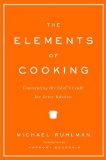It wasn’t enough to simply acquire more cookbooks than anyone could ever possibly work through. I had to acquire other literature about food. This has taken the form of food memoirs, food reference books, subject specific texts, etc. The latest of these books that I’ve inhaled is The Elements of Cooking: Translating the Chef’s Craft for Every Kitchen


The majority of the book is organized like a glossary with an alphabetical listing of terms and their definitions / descriptions / applications /etc. I know I belabored this point above, but it is so incredibly readable, that I actually just sat there and read through the glossary. There were of course many terms that were familiar to me and many that were not, but I found myself reading through the familiar items as well simply because I found the treatment so refreshing. You have to appreciate any author of a food reference book who lists “Common Sense” as an entry in their glossary.
At the beginning are eight essays collectively called “Notes on Cooking: From Stock to Finesse”. I know I’m gushing at this point, but they’re definitely worth reading as well. How much have you thought about stock? Well, Ruhlman’s thought about it plenty. He explains WHY THINGS WORK THE WAY THEY DO!!! I cannot stress this enough. Not step by step instructions – heck there’s not but one recipe in the entire book (it’s for stock, incidentally) – but why you add the aromats when you do and why you cook stock at a certain temperature and why it’s good to add bones bones and more bones. I would challenge that there’s not a single home cook out there that wouldn’t be an even better cook after absorbing some of the information in this book.
For my part, I will definitely be looking into reading more Ruhlman. My next most likely purchase will be The Making of a Chef: Mastering Heat at the Culinary Institute. The title alone has my interest piqued.